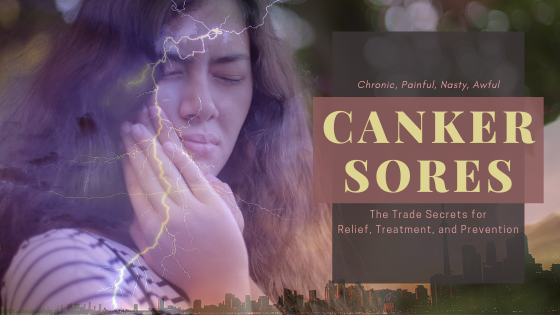
Occasional mouth sores irritate almost everyone from time to time, but for those of us who are unlucky enough to have reoccurring ones, they can be much more than a nuisance. For one thing, unlike related conditions like cold sores and dental abscesses, researchers don’t know why some people get them over and over. Whether you call them mouth ulcers, canker sores, or their clinical name, Aphthous stomatitis, these painful, inflamed, open sores can cause major problems. In fact, pain from chronic canker sores often interferes with everyday activities like eating, talking, swallowing, and sleeping.
I myself have suffered from frequent bouts of the canker curse since I was a child. At the worst points, I would develop multiple, huge sores that lasted for weeks and sometimes overlapped—one right after another—hurting for months on end. I tried every home remedy and over the counter treatment that I could get my hands on, and I popped ibuprofen like my life depended on it. Then suddenly: a miracle. I discovered the one treatment that really worked for me, and I didn’t even have to leave my job to get it. But more on that later, because In addition to that wonder cure, over the years I’ve also learned which home remedies actually work, which ones don’t do anything, and how to prevent canker sores in the first place.
Now I almost never have outbreaks. And since I know exactly what my fellow chronic canker sore sufferers go through, I’m happy to share my secrets with the whole South Valley Pediatric Dentistry community.
1. Calming Chronic Canker Sores at Home
 Most home remedies for mouth ulcers revolve around either cleaning, drying, or soothing the sore. Unfortunately, a lot of them just feel like burning your mouth with hot irons but don’t really do anything else. However, I have found a couple of tricks that can help in a pinch:
Most home remedies for mouth ulcers revolve around either cleaning, drying, or soothing the sore. Unfortunately, a lot of them just feel like burning your mouth with hot irons but don’t really do anything else. However, I have found a couple of tricks that can help in a pinch:
- Saltwater Rinse – Yes, this will sting. But it will also help gently disinfect the area, which can ultimately ease inflammation, reduce your pain, and speed the healing process. Mix 1 teaspoon of salt with 1/2 cup of warm water and gently swish, concentrating in the affected area, for 15-30 seconds. Then spit. Repeat as needed. It’s no instant cure, but it really can help. I do a nightly salt water rinse as soon as I feel any tenderness in my mouth to help prevent and/or shorten the duration of the sores.
- Baking Soda Rinse – The acid in tart foods like salad dressing and yogurt can cause or worsen canker sores. Unfortunately, acid is also delicious. Rinsing with baking soda (a base) after eating counteracts any remaining acidity, protecting the mouth from further damage. Follow the same procedure outlined above for the saltwater rinse, but replace the salt with 1 teaspoon of baking soda.
- Hot/Cold Compress – Ice packs help reduce swelling and inflammation, while warmth promotes healing. Use whichever sounds more soothing, or rotate between hot and cold every fifteen minutes for best results.
- Over-the-Counter Painkillers – Common pain relievers like ibuprofen or aspirin will make the pain from mouth sores much more manageable. Always make sure to follow the correct dosage instructions, and consult your primary care physician with any questions before taking or administering a new over-the-counter medicine.
- Topical Pain Relief – Though we do not recommend benzocaine products (like Orajel) for children under the age of two, adults and older children may find significant relief from canker sores by applying a small amount to the area. These over the counter topical analgesics can be used in conjunction with most pain relievers to achieve maximum relief. Be sure to use them sparingly, follow any package instructions, and ask your doctor about possible medication interactions.
2. An Ounce Of Prevention…

“An Ounce of Prevention is worth a pound of cure,” so the saying goes. That’s been true for me with my chronic canker sores. While the home remedies did offer a bit of relief, I much prefer avoiding the sores altogether. Here’s how I help manage my sensitive mouth:
- Brush and Floss – No really, everything in dentistry gets a little bit easier when you brush your teeth. We’re not making this up. Keep your mouth clean, get rid of all those nasty germs that wreak havoc all over the place, prevent cavities, and get less frequent canker sores. It’s a win, win, win, win, win…need I go on?
- Figure Out the Trigger – Though chronic canker sores don’t have one clear cause across the board, flareups often come down to one (or more) common canker sore triggers. Food allergies or sensitivities are by far the most common causes of severe, recurrent mouth ulcers. Additional possible triggers include medication reactions, chronic stress, illness, sensitivity to certain kinds of toothpaste, and/or excessive acid exposure due to an acidic diet, acid reflux, or even some eating disorders. In my case, I learned to avoid certain toothpaste brands and to thoroughly rinse my mouth out after using my asthma inhaler. Discovering what triggers the sores may require a bit of trial and error, but understanding and avoiding your individual triggers is the best way to avoid flareups.
- Hydrate, Hydrate, Hydrate – And did I mention, hydrate? When you’re dehydrated then food particles, bacteria, and other irritants cannot be naturally rinsed away by saliva, allowing them to them sit and fester. On the other hand, every time you drink water, it rinses out those foreign bodies and also triggers salivary activity which moisturizes your mouth.
- Quickly Treat Any Accident or Injury – Trauma to the soft tissue (cheeks, lips, or tongue) can trigger a mouth ulcer, so make sure to take care of any bites, bumps, or other injuries to the mouth. Immediately rinse out your mouth with water (or even better, with saltwater). Then prevent further irritation of the site by covering it with Orajel, petroleum jelly, throat coat tea, or raw honey. Avoid acidic or spicy food and refrain from touching the area (even with your tongue or teeth) until you’re sure the injury has completely healed.
3. Genuine Canker Sore Relief
Sometimes, despite your best efforts, canker sores will still pop up. Luckily, your dentist can take care of even the most stubborn mouth ulcers with a treatment of Sulfonated phenolics/sulfuric acid (brand name, Debacterol). In my case, this is the only medication that has ever completely, immediately, and permanently relieved my painful mouth ulcers and healed them almost overnight.
I can’t speak for everyone, or for dental professionals as a whole, but personally, I am a huge advocate of the stuff! I had other doctors try to treat me with and/or prescribe various other medications, but never with such good results. Every single time I’ve had canker sores treated at South Valley Pediatric Dentistry they stop hurting immediately and go away by the next day or two. That’s because this medication works in two ways: 1. by cauterizing and 2. by disinfecting the canker sores. The cauterization stops the pain and closes the wound, while disinfection reduces inflammation and promotes healing.
The only drawback is that the application process hurts. I’m not going to sugar coat that. The dentist has to dry your sore with a swab, which is rough on an inflamed ulcer in the first place. But then they use a tiny applicator to cover the entire sore with medication, which stings as it cauterizes. After that, though, the canker sore pain disappears for good! Chances are if your cankers are as painful and long-lasting as mine, one moment of increased pain in exchange for permanent relief sounds like a pretty good trade indeed.
Does your family deal with chronic canker sores? Call South Valley Pediatric Dentistry today for more information or to schedule an appointment!


